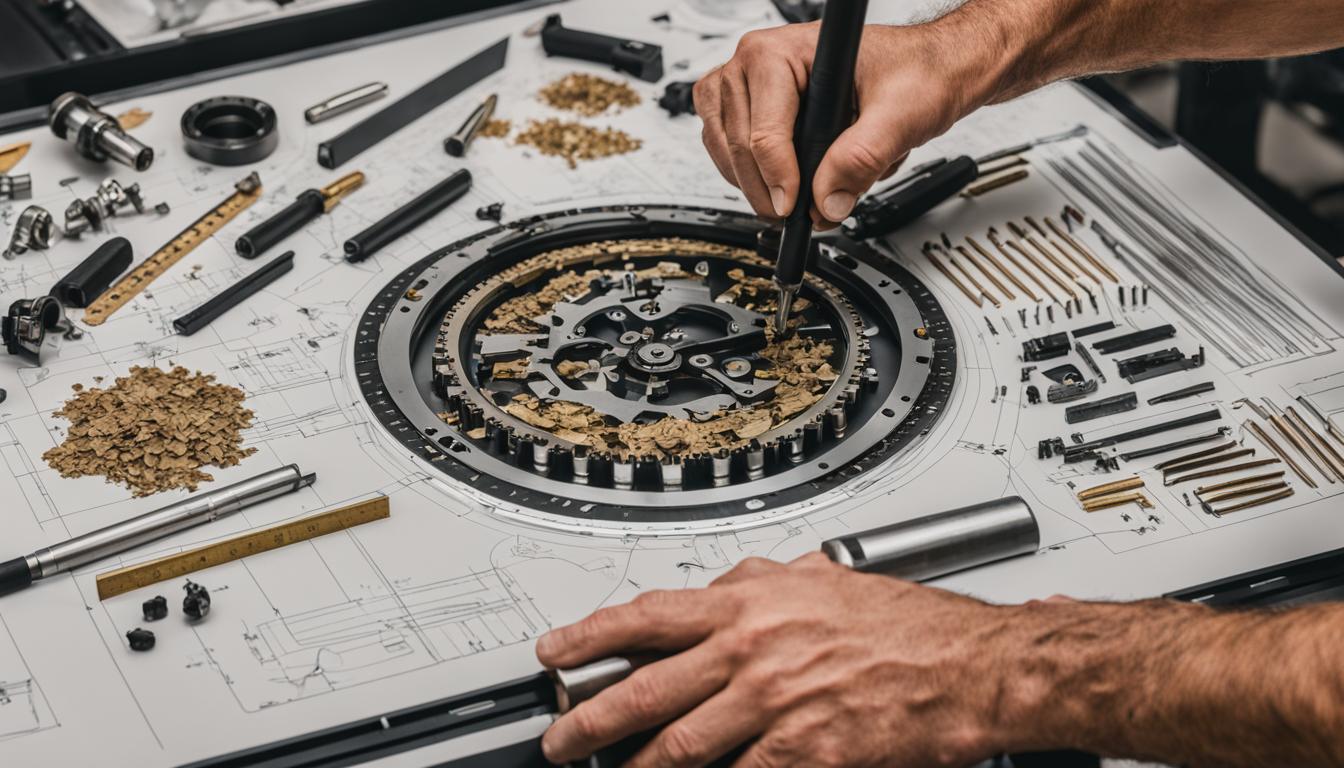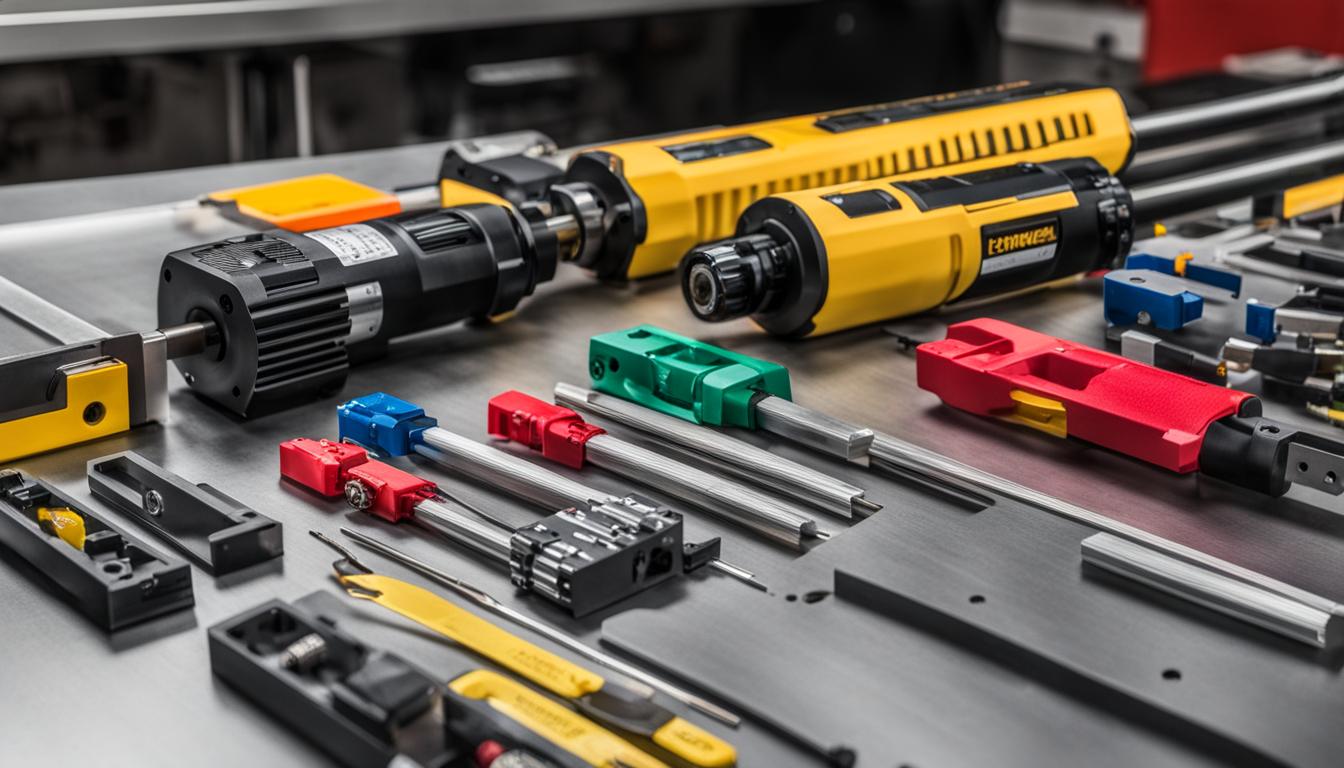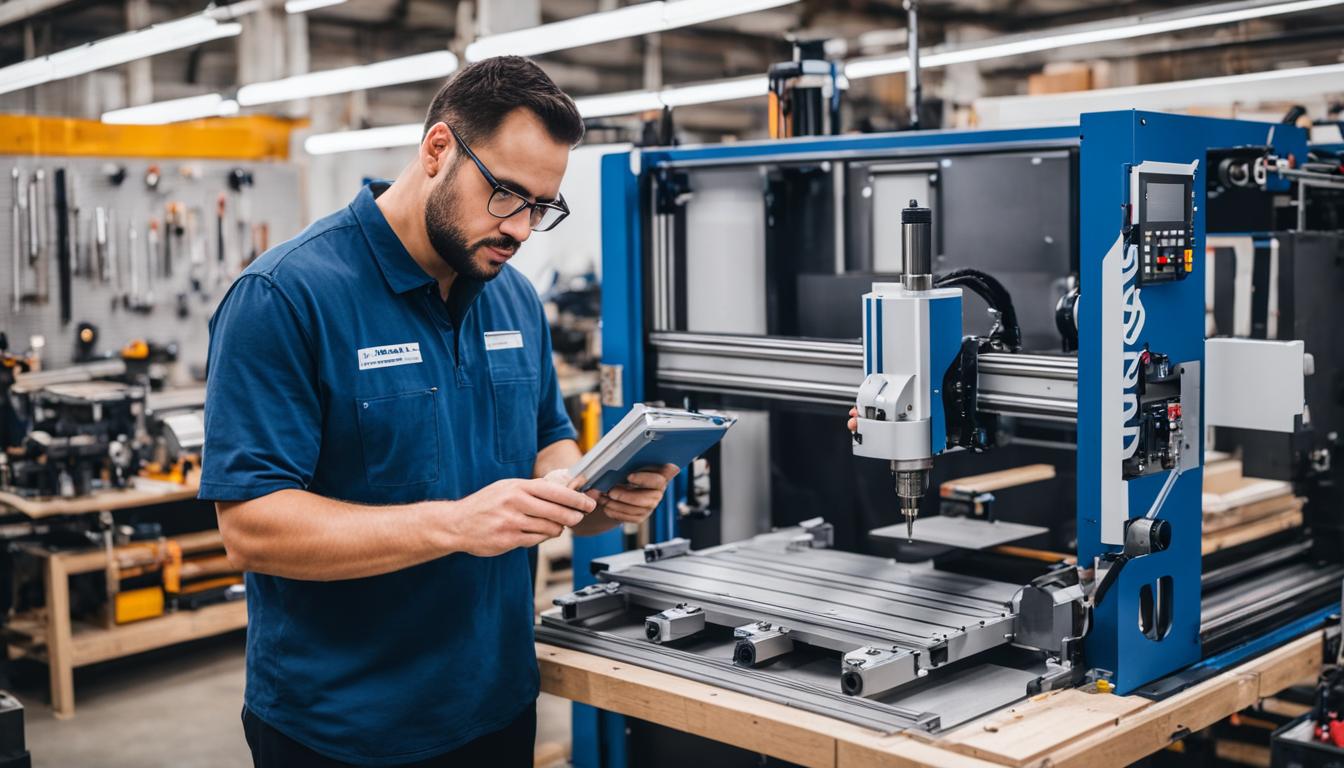Building your own CNC machine can be an exciting and rewarding project. With the right knowledge and resources, you can create a customized CNC machine right in your own home. In this guide, we will explore the possibilities of building your own CNC machine, providing tips and options for both DIY kits and building from scratch.
Key Takeaways
- Building your own CNC machine allows for customization according to your specific needs and projects.
- It can be a cost-effective option compared to purchasing a pre-built CNC machine.
- Building a CNC machine allows you to acquire valuable skills and a deeper understanding of its components and operation.
- Consider factors such as the type of projects you plan to undertake, your skill level, and your budget before embarking on a DIY CNC machine project.
- If building from scratch seems daunting, DIY CNC kits offer a convenient and cost-effective alternative.
The Benefits of Building Your Own CNC Machine
Building your own CNC machine offers several advantages. First, it gives you the freedom to customize the machine to suit your specific needs and projects. Whether you’re a hobbyist or a professional, having control over the design and functionality of your CNC machine allows you to tailor it to your exact requirements.
Second, building a homemade CNC machine can be a cost-effective option compared to purchasing a pre-built machine. By sourcing the components and materials yourself, you can potentially save money on the overall cost of the project. Additionally, you have the flexibility to choose between budget-friendly or high-performance parts, depending on your budget and desired outcome.
Lastly, building your own CNC machine provides an invaluable learning experience. You can gain a deeper understanding of the machine’s components, mechanics, and operation. This knowledge not only enhances your ability to troubleshoot and maintain the machine, but it also empowers you to tackle more complex projects in the future.
Whether you’re interested in woodworking, metalworking, or other creative endeavors, building a CNC machine at home opens up a world of possibilities. Plus, it’s a rewarding and fulfilling endeavor that allows you to showcase your craftsmanship.
Benefits of Building Your Own CNC Machine:
- Customization to suit specific needs and projects.
- Potential cost savings compared to purchasing a pre-built machine.
- Opportunity to learn valuable skills and gain a deeper understanding of the machine’s components and operation.
In the next section, we will explore the factors to consider before undertaking a DIY CNC machine project. By understanding these factors, you can make an informed decision and embark on a successful CNC machine building journey.
Factors to Consider Before Building a CNC Machine
Before embarking on a DIY CNC machine project, there are several factors to consider. First, determine the type of projects you plan to undertake with the machine, as different types of CNC machines are better suited for specific projects. Additionally, assess your skill level and the amount of time you can dedicate to the project. Finally, establish a budget and consider the cost of the necessary components and tools.
Building a DIY CNC machine offers a cost-effective solution for those who want to have a customizable and affordable CNC machine. However, it is essential to evaluate your needs, skills, and resources before diving into the project. By considering these factors, you can ensure a successful and fulfilling CNC machine-building experience.
Factors to Consider:
- Type of projects to undertake
- Skill level and time commitment
- Budget and cost of components and tools
By carefully considering these factors, you can make an informed decision about building a DIY CNC machine that aligns with your needs and resources. Whether you’re a hobbyist or a professional, building a CNC machine can be a rewarding endeavor that provides you with a versatile tool for various projects.

Building a CNC Machine from Scratch
Building a CNC machine from scratch can be a challenging but rewarding endeavor. By following a series of steps, you can create a homemade CNC router that suits your specific needs and requirements. Here’s a breakdown of the process:
1. Designing Your CNC Machine
Start by creating a detailed design for your CNC machine. Consider factors such as the size, dimensions, and functionality you desire. Determine the components and materials you will need for the construction.
2. Gathering Materials and Tools
Purchase the necessary parts and tools for your DIY CNC machine. This may include stepper motors, linear slides, spindle, controller board, and other components. Make sure to also have the required tools for assembly, such as screwdrivers, wrenches, and soldering equipment.
3. Constructing the Frame
Begin the construction process by building the frame of your CNC machine. This involves cutting and assembling the structural elements according to your design. Use sturdy materials such as aluminum or steel to ensure stability and rigidity.
4. Assembling the Components
Once the frame is complete, start assembling the various components of your CNC machine. This includes mounting the stepper motors, attaching the linear slides, installing the spindle, and connecting the wiring. Follow the instructions provided with each component to ensure proper installation.
5. Wiring and Electronics
Next, wire the electronics of your CNC machine, including the controller board, power supply, limit switches, and any additional peripherals. Take care to properly organize and secure the wiring to prevent any interference or damage.
6. Testing and Calibration
Once all the components are assembled and wired, it’s time to test your CNC machine. Power it on and verify that all the motors, sensors, and other devices are functioning correctly. Perform calibration procedures to ensure accurate movement and positioning.
7. Software and Programming
A CNC machine requires software to control its movement and operation. Choose a suitable CNC software, such as Mach3 or other compatible options, and install it on your computer. Learn how to program the machine to execute your desired tasks, such as cutting, milling, or engraving.
8. Fine-Tuning and Adjustments
After the initial testing, you may need to make fine-tuning adjustments to optimize the performance of your CNC machine. This can include adjusting belt tensions, fine-tuning motor settings, and calibrating the machine for precision and accuracy.
Building a CNC machine from scratch is a time-consuming process that requires patience and attention to detail. While it may take several weeks or months to complete, the end result is a customized CNC machine that you can be proud of.
DIY CNC Kits as an Option
If building a CNC machine from scratch seems daunting, DIY CNC kits can be a great option. These kits come with all the necessary components and detailed instructions for assembly. They offer a convenient and cost-effective way to build your own CNC machine without the need for extensive technical skills. Many kits also allow for customization, so you can choose the features that best suit your needs.
Building a CNC machine from a kit provides several advantages. Firstly, it eliminates the need to source individual components, saving you time and effort. Secondly, the instructions provided with the kit make the assembly process easier and more straightforward. This is particularly beneficial for those new to CNC machines or DIY projects. Additionally, most kits include pre-programmed control software, simplifying the setup process.
Another benefit of using DIY CNC kits is the cost-saving aspect. Purchasing a ready-made CNC machine can be expensive, while kits offer a more affordable alternative. By opting for a kit, you can obtain a high-quality CNC machine at a fraction of the cost.
Furthermore, DIY CNC kits allow for customization, enabling you to tailor the machine to your specific needs and preferences. You have the flexibility to choose the size, cutting area, spindle power, and other features that align with your project requirements.
Overall, DIY CNC kits provide an accessible and practical option for building a CNC machine. They eliminate many of the complexities associated with building from scratch, making it easier for beginners to get started. Whether you’re a hobbyist or a professional, a CNC machine kit can be an excellent investment that empowers you to bring your ideas to life.
Choosing the Right CNC Kit
When it comes to building your own CNC machine, choosing the right CNC kit is crucial. It is important to consider factors such as your budget, desired features, and the level of customization offered by the kit. By selecting the best CNC kit for beginners, you can ensure a smooth and successful building process.
Researching different brands and models of CNC kits is essential to find one that meets your specific requirements. Reading user reviews and testimonials can provide valuable insights into the quality and performance of different kits. Look for kits that have positive feedback and a reputation for reliability.
Factors to Consider:
- Budget: Determine how much you are willing to invest in a CNC kit. Remember to consider additional costs, such as tools and other accessories.
- Desired Features: Identify the specific features you need for your projects. This can include the size of the machine, the type of materials it can work with, and any additional capabilities.
- Customization Options: Some CNC kits offer a higher level of customization, allowing you to further tailor the machine to your needs. Consider whether you require this flexibility.
- Customer Support: Ensure that the kit you choose comes with good customer support. This will be helpful in case you encounter any issues or need assistance during the building process.
- Resources for Troubleshooting and Expansion: Look for kits that provide comprehensive documentation, tutorials, and forums to assist you in troubleshooting common problems and expanding your machine as you gain more experience.
By taking these factors into account and conducting thorough research, you can select the best CNC kit for beginners that aligns with your needs and goals.

CNC Machine Building Costs and Time Frame
When considering building your own CNC machine, it is important to understand the associated costs and time frame. The cost of building a CNC machine can vary depending on factors such as the size, complexity, and quality of components.
If you choose to build a DIY CNC machine from scratch, you may need to invest more in materials and tools compared to using a ready-made CNC kit. The quality of the components you choose will also affect the final cost of your machine. It is recommended to research and compare prices from different suppliers to find the best balance between cost and quality.
On the other hand, if you opt for a ready-made CNC kit, the cost will generally be lower as all the necessary components are included in the kit. However, keep in mind that some customization options may come with an additional cost.
As for the time frame, building a custom CNC machine takes time and patience. The duration can vary depending on several factors, including your skill level, the availability of materials, and the desired level of precision. On average, it may take a few weeks to several months to complete the construction and assembly process.
When building a CNC machine from scratch, you will need to allocate additional time for designing the machine and sourcing the required components. Building from scratch allows for more customization options, but it also requires more time and effort.
On the other hand, using a ready-made CNC kit can save you time in terms of designing and sourcing components. However, the assembly process still requires careful attention to detail and may take several weeks, depending on your experience and familiarity with the instructions.
Estimated Time Frame for CNC Machine Building
| Building Method | Time Frame |
|---|---|
| Building from Scratch | Several weeks to several months |
| Using a Ready-Made CNC Kit | Several weeks to a few months |
Remember, the time frame mentioned above is just an estimate and can vary based on individual circumstances. It is essential to plan and allocate sufficient time for the construction process to ensure a successful outcome.
Necessary Skills for Building a CNC Machine
To successfully build a CNC machine, there are several essential skills that you’ll need to possess or develop along the way. Combining woodworking, metalworking, and technical expertise, these skill sets are crucial for constructing a functional and efficient CNC machine.
Woodworking Skills
Woodworking skills are important when building a CNC machine as it involves creating the frame, mounting components, and ensuring stability. Knowledge of using saws, drills, and other woodworking tools will be advantageous during the construction process.
Metalworking Skills
In addition to woodworking, having metalworking skills will be beneficial when working with metal components such as brackets, supports, and spindle mounts. Proficiency in cutting, drilling, and welding metals will help you fabricate and assemble the necessary parts for your CNC machine.
Technical Drawings and Instructions
To properly build a CNC machine, you should be able to read and interpret technical drawings and instructions. These resources will guide you in understanding the specifications and dimensions of the components, ensuring accurate assembly and alignment.
Tool Familiarity
Familiarity with a variety of tools is essential for building a CNC machine. Being comfortable with drills, saws, calipers, and other measuring and cutting tools will enable you to accurately fabricate and assemble the required components.
While having proficiency in these skills can contribute to a smoother construction process, don’t be discouraged if you’re a beginner. Starting with simpler projects and gradually building your experience will help you acquire the necessary skills to successfully build a CNC machine.
CNC Machine Controllers and Software
Operating a CNC machine requires a reliable controller and powerful software. To ensure optimal performance and precision, it is crucial to choose the right tools for the job. Two popular options in the industry are the Mach3 CNC controller and various CAD/CAM software programs.
Mach3 CNC Controller
Mach3 is widely recognized as a top-notch CNC controller in the market. It offers a user-friendly interface that allows for easy control and management of your CNC machine. With Mach3, you can efficiently handle complex machining operations, monitor real-time spindle speed and position, and make necessary adjustments to optimize performance.
One of the standout features of Mach3 is its compatibility with a wide range of CNC machines, making it a versatile choice for hobbyists and professionals alike. Its robust capabilities, combined with its user-friendly interface, provide a seamless and efficient CNC machining experience.
CAD/CAM Software for CNC Machines
In addition to a reliable CNC controller like Mach3, CAD/CAM software is an essential component for designing and generating tool paths for your CNC machine. There are several popular CAD/CAM software programs available, including Type3, ArtCAM, Solidworks, and AutoCAD.
These software programs offer a wealth of tools and features to facilitate the design and preparation of your CNC projects. With CAD/CAM software, you can create intricate 2D and 3D designs, import or draw your own schematics, and simulate the tool path to ensure precise and accurate results.
Each CAD/CAM software program has its own unique set of features and capabilities, catering to different design requirements and user preferences. Consider your specific needs and project goals when selecting the most suitable software for your CNC machine.
| CNC Controller | Key Features |
|---|---|
| Mach3 |
|
| CAD/CAM Software | Main Functions |
|---|---|
| Type3 |
|
| ArtCAM |
|
| Solidworks |
|
| AutoCAD |
|
Possible Projects with a DIY CNC Machine
When it comes to DIY CNC machine projects, the possibilities are truly endless. With the accuracy and precision of a DIY CNC machine, you can bring your creative ideas to life and embark on a wide range of projects. Whether you are a hobbyist or a professional, here are some exciting things you can make with a DIY CNC machine:
Intricate Woodworking Designs: With a DIY CNC machine, you can create intricate and detailed woodworking designs that would be challenging to achieve by hand. From intricate patterns on furniture and decorative pieces to custom wooden signs and plaques, the precision of a CNC machine ensures high-quality results that will impress anyone.
Cutting and Milling Materials: A DIY CNC machine allows you to cut and mill a variety of materials with ease. You can work with materials such as PCBs (Printed Circuit Boards), acrylic, and aluminum, turning them into custom parts, prototypes, or even personalized jewelry. The versatility of a CNC machine opens up a world of possibilities for your creativity.
Customized Signs, Stamps, and Molds: Personalization is key in many projects, and a DIY CNC machine excels at creating unique and customized signs, stamps, and molds. Whether you need a personalized sign for your home or business, custom stamps for branding purposes, or intricate molds for resin casting, a CNC machine gives you the precision and detail to achieve stunning results.
With a DIY CNC machine at your disposal, you can explore your creativity and take on a wide variety of projects. Whether you are a woodworking enthusiast, a hobbyist looking to create one-of-a-kind items, or a professional seeking to streamline your production process, a CNC machine is a valuable tool that provides accuracy, precision, and endless possibilities.
